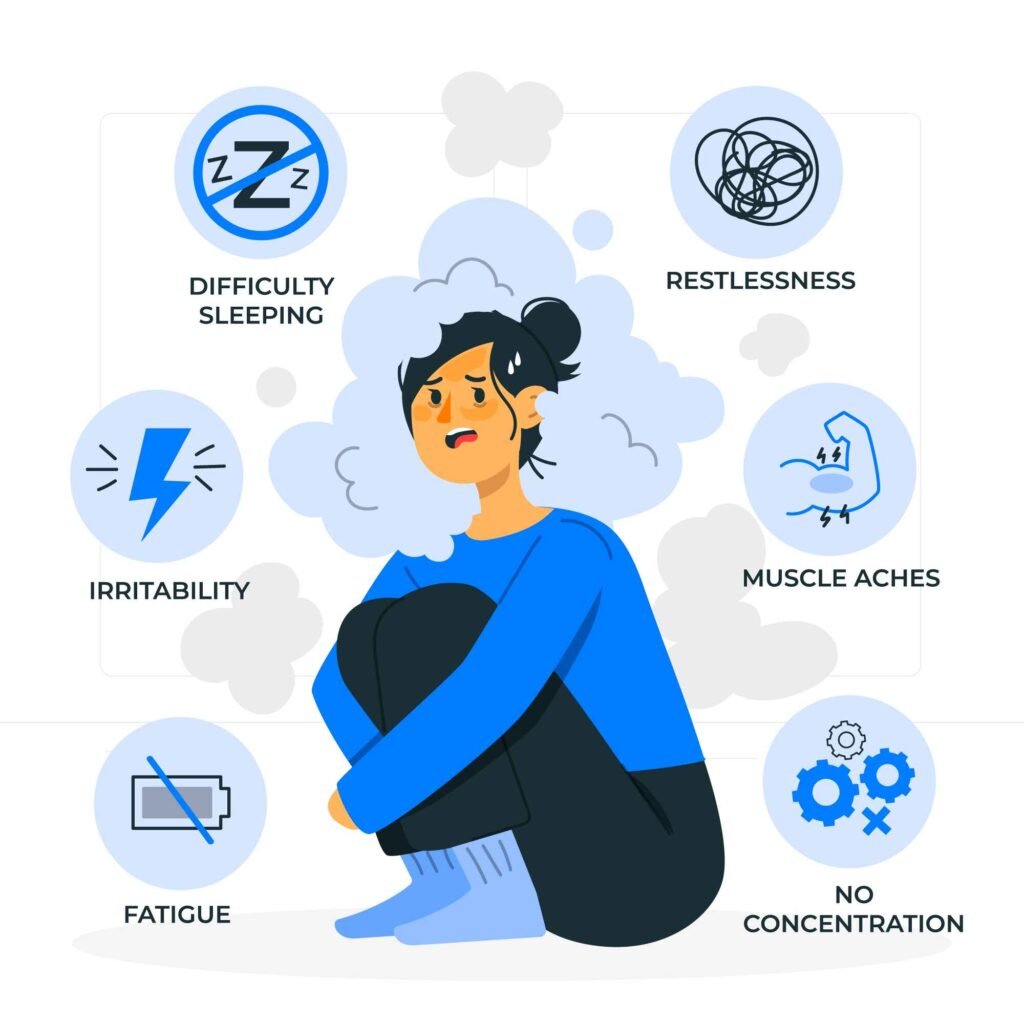
High-functioning anxiety is a unique form of anxiety that often flies under the radar. Unlike traditional anxiety, which can be paralyzing and obvious to those around you, high-functioning anxiety is characterized by outward success and competence while inwardly struggling with stress, overthinking, and relentless self-doubt. You may seem to have it all together, but the reality is far from calm.
In this article, we’ll discuss how to recognize high-functioning anxiety, its subtle but impactful signs, and strategies for managing it effectively. If you’re reading this, you might see yourself or someone you care about reflected in these words. Let’s dive into understanding this often-misunderstood form of anxiety, and learn how to better cope with it.
What is High-Functioning Anxiety?
High-functioning anxiety is not a clinical diagnosis, meaning it’s not officially recognized in the DSM-5 (the Diagnostic and Statistical Manual of Mental Disorders) like generalized anxiety disorder (GAD) or panic disorder. However, it’s a term that resonates with many who struggle internally while maintaining a seemingly “normal” life on the outside.
People with high-functioning anxiety may excel at work, seem reliable, and always stay on top of their responsibilities. Behind the scenes, however, they battle negative thoughts, the fear of failure, and obsessive perfectionism. They keep their anxiety hidden, which is why this form of anxiety can often go unnoticed or misunderstood by those around them.
Signs of High-Functioning Anxiety
High-functioning anxiety can manifest in ways that are not always immediately obvious. Here are some of the telltale signs:
1. Perfectionism and Overachieving
One of the most common signs of high-functioning anxiety is the need for perfection. You may feel compelled to perform flawlessly in every area of your life. This could lead to overworking, overcommitting, and taking on more responsibilities than you can reasonably handle.
Even though perfectionism is often admired, it can come at the cost of your mental health. You may spend hours obsessing over details that others wouldn’t even notice, all while downplaying your stress.
2. Fear of Failure
A powerful driver of high-functioning anxiety is the fear of failure. Individuals with high-functioning anxiety tend to avoid any mistakes because they worry deeply about how others perceive them. This constant fear of failure leads to avoiding new situations or opportunities that could potentially involve failure.
3. People-Pleasing Tendencies
People with high-functioning anxiety often struggle to say “no” and may overextend themselves to meet others’ expectations. The idea of letting someone down can be too anxiety-provoking, which leads to taking on too many commitments and feeling overwhelmed.
As a result, they may experience chronic burnout and exhaustion, trying to keep up with both their personal expectations and the expectations of others.
4. Internal Negative Dialogue
Another hallmark of high-functioning anxiety is an intense inner critic. This voice constantly reminds you that you aren’t good enough, that you need to work harder, or that you will eventually be “found out” as a fraud—often known as imposter syndrome.
5. Difficulty Relaxing
Because the drive to achieve is always present, taking breaks or allowing yourself to relax can feel like a waste of time. Many with high-functioning anxiety find it nearly impossible to fully disconnect, whether from work, planning, or even worrying. Their minds race with to-do lists, and they may have trouble sleeping because they are mentally rehearsing tasks for the next day.
6. Hidden Physical Symptoms
High-functioning anxiety doesn’t only affect the mind; it can take a physical toll as well. You may experience muscle tension, headaches, gastrointestinal issues, or fatigue. Many people cope with their anxiety by relying on caffeine to power through the day and alcohol to unwind at night. These coping mechanisms can provide temporary relief but often make anxiety worse in the long run.
The Effects of High-Functioning Anxiety on Daily Life
While high-functioning anxiety may not prevent you from getting through your daily tasks, it significantly impacts your quality of life. You may appear competent and successful, but you’re constantly battling negative thoughts, feelings of inadequacy, and exhaustion. Relationships may also suffer, as you’re unable to be fully present with loved ones due to being preoccupied with your worries.
Strategies to Manage High-Functioning Anxiety
If you recognize these signs in yourself, know that you are not alone, and there are strategies you can use to better manage your anxiety. Here are some techniques that can help:
1. Recognize and Name It
One of the first steps to managing high-functioning anxiety is acknowledging it. High-functioning anxiety can thrive when it’s denied or hidden. Simply recognizing that you are dealing with anxiety, even if you are able to function well, can help reduce the power it has over you.
2. Practice Self-Compassion
People with high-functioning anxiety often have high expectations for themselves, which can lead to harsh self-criticism. Practicing self-compassion involves treating yourself with the same kindness and understanding that you would offer a friend. Remind yourself that it’s okay to not be perfect and that everyone makes mistakes.
Dr. Kristin Neff, a leading researcher in the field of self-compassion, encourages people to embrace their flaws and recognize that suffering and imperfection are part of the human experience.
3. Set Boundaries
Learning to say “no” can be challenging but is crucial in managing high-functioning anxiety. Taking on too much only fuels anxiety and leaves you feeling depleted. Practice setting boundaries by politely declining requests that would add unnecessary stress to your life. Saying “no” is not a failure; it’s an essential form of self-care.
4. Reframe Negative Thoughts
Cognitive reframing is a powerful tool in managing anxiety. It involves challenging negative thoughts and replacing them with more realistic ones. For example, if you catch yourself thinking, “I have to be perfect or else I will fail,” try to reframe it as, “I am allowed to make mistakes, and I will learn from them.”
By consistently reframing your thoughts, you can reduce the power that your anxiety has over you.
5. Schedule Time to Worry
It may seem counterintuitive, but scheduling “worry time” can help you manage anxiety. Set aside 15-30 minutes each day specifically to worry about everything on your mind. When anxious thoughts pop up during the day, remind yourself that you will have time to address them later. This technique helps prevent rumination and can reduce overall anxiety levels.
6. Practice Mindfulness and Relaxation Techniques
Mindfulness meditation and relaxation exercises, like deep breathing, can help calm an anxious mind. Research has shown that mindfulness can significantly reduce anxiety by helping individuals stay present rather than worrying about the future or dwelling on the past.
One simple technique is box breathing: inhale for four counts, hold for four counts, exhale for four counts, and hold again for four counts. Repeat this cycle for a few minutes to calm your nervous system.
7. Seek Professional Help
There is no shame in seeking professional help for anxiety, even if you feel like you’re “functioning” fine. Therapy, especially cognitive-behavioral therapy (CBT), can be incredibly effective in treating anxiety. A therapist can help you understand the root of your anxiety and develop coping strategies to manage it.
Medication may also be an option for those whose anxiety significantly impacts their quality of life. Speak to your healthcare provider about whether medication is right for you.
8. Reduce Stimulants
Many people with high-functioning anxiety rely on stimulants like caffeine to get through their day. However, caffeine can worsen anxiety symptoms. If you notice that your anxiety spikes after your morning coffee, consider gradually reducing your intake or switching to a lower-caffeine alternative like green tea.
9. Focus on Achievable Goals
Set small, achievable goals rather than overwhelming yourself with lofty expectations. Break tasks into manageable steps, and celebrate each accomplishment along the way. This helps counteract the perfectionism that often accompanies high-functioning anxiety.
Final Thoughts: It’s Okay to Ask for Help
If you identify with high-functioning anxiety, it’s important to remember that help is available. Anxiety, even in its high-functioning form, can take a toll on your well-being and relationships. You deserve to live a life that is fulfilling, balanced, and not driven by fear of failure or need for perfection.
Managing high-functioning anxiety requires acknowledging it, setting boundaries, practicing self-compassion, and seeking help when needed. It’s okay to not have it all together all the time. By taking small, deliberate steps, you can begin to manage your anxiety and lead a more balanced life. Remember, you don’t have to do it alone—reach out for support from friends, family, or a mental health professional when you need it.



